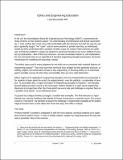| dc.description.abstract | ABET recommends the study of ethics so that students acquire “an understanding of professional and ethical
responsibility”. For the most part, teaching of the subject relies upon the use of scenarios - both hypothetical
and “real”- and open discussion framed by the codes. These scenarios and this framing strike me as seriously
deficient - lacking in their attention to the complexities of context, almost solely focused on individual
agency, while reflecting too narrow and simplistic a view of the responsibilities of the practicing engineer. A
critique of several exemplary scenarios, and consideration of the demands placed upon today’s professional,
prompt reflection on the need for, not just a more expansive reading of the codes of ethics re what it might
mean to be “responsible”, but a substantial reform of undergraduate engineering education across the board. | en |
